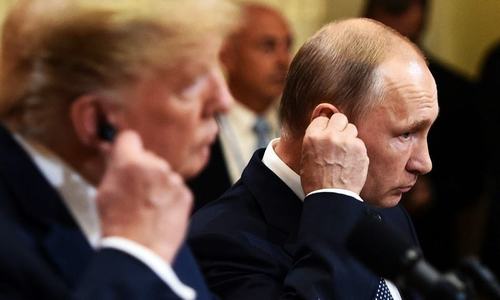PARIS: Three EU countries on Tuesday launched a process charging Iran with failing to observe the terms of the 2015 deal curtailing its nuclear programme, a move that sparked anger and threats from Tehran at a time of intensifying tensions.
Britain, France and Germany insisted they remained committed to the agreement, which has already been severely tested by the US exit from the accord in 2018.
But even as their statement was released, British Prime Minister Boris Johnson indicated he might prefer a comprehensive accord negotiated with US President Donald Trump instead of the 2015 deal.
The decision to begin the so-called dispute mechanism process comes as tensions soar between the West and Iran following the killing of top commander Qassem Soleimani in a US strike, and the admission by Tehran days later that it had accidentally shot down a Ukrainian airliner.
The foreign ministers of the three European nations said Iran had been progressively scaling back its commitments under the deal since May last year.
“We have therefore been left with no choice, given Iran’s actions,” to begin the dispute process, their statement said.
The 2015 nuclear deal signed in Vienna — known as The Joint Comprehensive Plan of Action (JCPoA) — has a provision that allows a party to claim significant non-compliance by another party before a joint commission.
If the issue is not resolved by the commission, it then goes to an advisory board and eventually to the UN Security Council, which could re-impose sanctions.
The first meeting of the process — set to include the European nations, Iran and the other parties to the deal, China and Russia — would take place in Austria by the end of the month, a diplomatic source told AFP in Vienna.
Iran had intensified activities to enrich uranium, in response to Trump’s pulling out of the deal.
Its latest step in January to forgo the limit on the number of centrifuges used in uranium enrichment prompted the Europeans to trigger the mechanism.
But Tehran lashed out at the European countries and appeared to threaten unspecified retaliation.
“Of course, if the Europeans [...] seek to abuse (this process), they must also be prepared to accept the consequences,” the foreign ministry said in a statement.
Published in Dawn, January 15th, 2020













































Dear visitor, the comments section is undergoing an overhaul and will return soon.